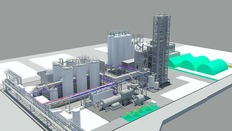- The facility will recycle 65,000 tonnes of plastics, starting with 26,000 tonnes in 2024 and scaling up by 2027.
- The total investment is €100 million, with €10.5 million in government support.
- The plant will focus on recycling polystyrene and polyolefins.
- The project aims to save 227,500 tonnes of CO2 annually after expansion.

Project Overview
Indaver is constructing a new Plastics2Chemicals facility in the Port of Antwerp, Belgium. This plant will recycle 65,000 tonnes of end-of-life plastics into basic chemicals, with an initial capacity of 26,000 tonnes starting in early 2024 and full capacity by 2027. The project represents a €100 million investment, including €10.5 million in government support.
Government Support and Innovation
The Flemish government is providing €7.5 million in repayable advances, and an additional €3 million comes from the Flemish recycling hub. This support underscores Flanders' commitment to sustainable recycling and innovation, aiming to meet European recycling goals for plastics.
Recycling Process
The facility will focus on recycling polystyrene and polyolefins, using a thermochemical process to depolymerize plastics into basic raw materials. These materials will meet high-quality standards, including those required by the food industry, thus closing the materials loop in a circular economy.
Environmental Impact
The project is expected to significantly reduce CO2 emissions, saving around 90,000 tonnes of CO2 in its initial phase and up to 227,500 tonnes annually after expansion. This contributes to the transition to a circular economy and supports Flanders' climate goals.
Strategic Importance
The development of this recycling hub in the Port of Antwerp will create approximately 50 direct jobs and strengthen the region's economic and industrial fabric. The initiative aligns with the Circular Plastics Alliance's goals, ensuring access to recycled raw materials for future petrochemical investments.

